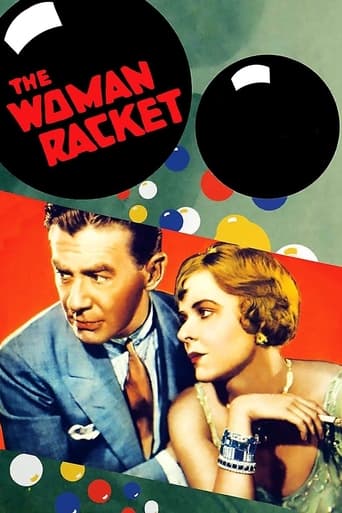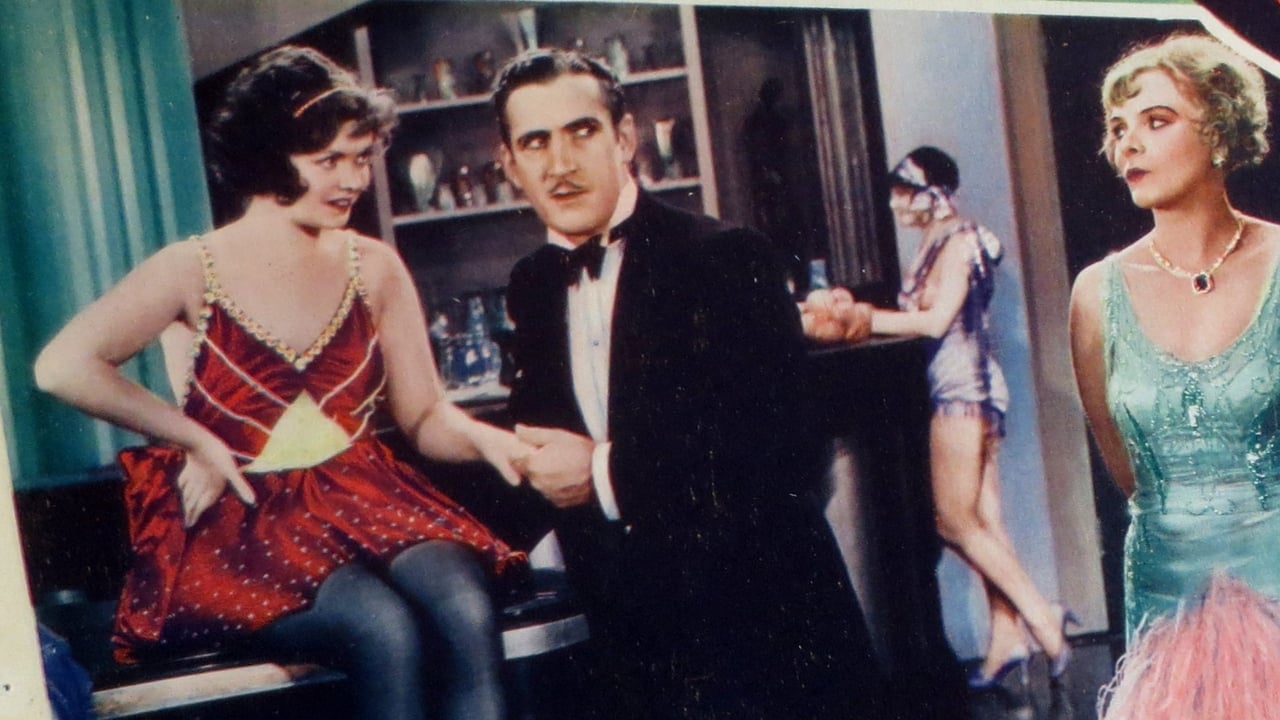drednm
THE WOMAN RACKET is an early MGM talkie filmed in 1929 and released in January 1930. It's a crime drama notable as the feature-film talkie debut of Blanche Sweet, who had returned from England, where she filmed her final silent film (THE WOMAN IN WHITE). She had made one Vitaphone short at Warners before tackling this feature at MGM. Interestingly, Photoplay magazine had run a squib about MGM's interest in shooting ANNA CHRISTIE as a talkie and Blanche Sweet was rumored to be in line to star in the remake of her 1923 silent film. In this talkie, Sweet is very very good as Julia and pulls out all the stops as the speakeasy hostess who gets in over her head. She even sings "He's Good Enough for Me" atop a piano. The film is sunk, however by only so-so performances by Tom Moore as her cop husband and John Miljan as the snarky club owner. The film was apparently also released as a silent. There are also a couple of obvious sound issues. In any case, the film apparently didn't do much at the box office and Sweet obviously didn't get another crack as playing Anna Christie.
kidboots
Big things were expected of Sally Starr - she was one of the many actresses who were bought to the movies to be the next Clara Bow, but there really wasn't a next anything for Sally. She had a featured article in Photoplay - but what was this, she rode in a bus to and from the studio, didn't attend parties and was tucked up in bed by 10 pm!! She may have looked like a "vest pocket edition of Clara Bow" but she had none of Clara's personality, charisma or talent - maybe she should have gone to some parties, or at least some dancing lessons!! Blanche Sweet, however, was riding on a short wave of renewed popularity. It was 1929 and suddenly "those in the know" realised she could talk and usually took acting honours away from her newer, flashier co-stars (Alice White).Officer Tom (Tom Moore) pinches singer Julia (Sweet) in a raid on a gambling den but when she pleads innocent of any wrong doing he believes her and they become a couple. Married life brings disillusion to Julia, who is fed up with scrimping and saving and wants to go back to her old profession. She sneaks a visit to her old club where a shyster manager, Chris (did John Miljan ever play any other roles) persuades her to sing "He's Good Enough For Me" - Miss Sweet does a great job!!Things go from bad to worse with Julia going back to work at the "Blue Moon" nightclub and missing out on the police parade to celebrate Tom's promotion to Sergeant. Enter Buddy (Sally Starr), who's cute and cuddly but won't get anywhere, based on her dancing. She performs "Call Me to Arms" and her dancing is terrible - it's all arms!! She is Julia's protégé and Julia is determined that she will stay fresh and clean and that means keeping Chris away from her. When a big winner from the club is found badly beaten and later dies, Julia, who was force to show him a good time, can see she was set up and is going to be blamed for his murder. She desperately wants to see Tom and tell all she knows about Ben but almost doesn't make it!!Always wanted to hear those immortal words spoken "Ooooh... he got me"!!! and I did - in this movie!!!
MartinHafer
Blanche Sweet was a huge star during the silent era--having appeared in something like 150 films. However, by the time talking pictures came along, her career came to an almost complete halt. In 1930 she made three minor talkies--and then retired from the movies to play on Broadway and have a family. Only in the 1950s did she return for a few small TV roles. What's amazing about this is that her movie career was over by the time she was 34--even though she was a very popular silent star. I don't think the problem was her voice (although here in "The Woman Racket" they had her sing....and this was NOT a good idea but her speaking voice was fine) but simply tastes as well the Hollywood love of the very young.The plot idea for "The Woman Racket" is a bit hard to believe. The film begins with a raid on a speakeasy. When one of the cops finds a lady there and feels sorry for her (Sweet), he lets her go. Soon they begin dating and marry. As I said, it's a bit hard to believe. However, in a nod to reality, the marriage is not all it's cracked up to be for her. Staying home and being a housewife is dull stuff and soon Sweet is sneaking out to her old life as a singer in nightclubs--which was a serious problem since these sort of clubs sold liquor and it was during Prohibition. Eventually, she leaves him...and that's only the first quarter of the movie. What happens next? See for yourself.When you watch a film from this era, you need to change your expectations a bit. Early talkies had relatively poor sound, lacked incidental music and were a bit more static (as they hadn't yet figured out how to pick up the sound while folks moved about the set). So, taking this in mind and comparing the film to like films of the same era is how I rated this film--not compared to the much more polished products being released just a few years later. And, keeping this in mind, it's an average film--no better, no worse than others. It is a bit scandalous and moralistic. Tom Moore, who co-stars, has the on-screen personality of saw dust--and that also doesn't help much. But, the story is a big racy--and that might keep you interested. Had it been made a few years later, I would have probably given it a 3 or 4.By the way, according to IMDb, like many early talkies, this was filmed in both a sound and silent version. This made sense, as the switch to sound was not instantaneous--and many smaller theaters simply weren't wired for sound. Plus, in the case of MGM (the slowest of the major studios to switch to sound), I really think they were just hoping sound was a passing fad and hoped it would vanish.
frankfob
Blanche Sweet plays a singer at a speakeasy who is caught by a cop during a raid, but instead of arresting her, he lets her go and eventually winds up marrying her. However, life as a cop's wife turns out to be not quite what she expected, and she longs for the excitement and fun of her former career. One day, after a particular trying day at home, she goes back to her old nightclub and meets up with the good-hearted owner (Tenen Holtz) and his slimy new business partner (John Miljan, terrific as usual). She leaves her husband to become the club's singer and, eventually, Miljan's mistress, and before she knows it she finds herself involved in a murder.This is an interesting little crime drama, more suited to Warner Bros. than MGM, but even though the pacing tends to be a little choppy and the camera-work is a bit shaky at times, it's eminently watchable. Blanche Sweet is pert, cute and charming and a pretty good singer, and few villains were slicker or more sophisticated than Miljan. Tom Moore as Sweet's cop husband leaves a bit to be desired; he's actually too old for her, pours on the Irish charm (and brogue) a bit too thick and comes across as a bit naive for a tough New York City cop. Nevertheless, it's a pretty good little picture overall, helped along greatly by Sweet (it's a shame her career never really took off during the talkie era).The direction is credited to two men, Robert Ober and Albert H. Kelley. This was Ober's only directorial effort--he was an actor--and Kelley was a "full-time" director. My best guess is that Kelley was brought in when the task proved to be too much for Ober. If so, he actually did a pretty good job. Kelley spent his career mired in the lower depths of Poverty Row, churning out shorts, low-rent crime dramas and cheap jungle pictures for the likes of PRC, Monogram and Republic. This looks like it was his shot at big-time features, and for some reason he didn't--or couldn't--capitalize on it. It's too bad, because he shows potential here that was absent in most of his subsequent pictures.Overall this is definitely a picture to watch. Although it was made in 1930, I've seen plenty of films that came out several years after this that weren't as well-made, fluidly paced, well-shot or entertaining as this is. Give it a shot.


 AD
AD
